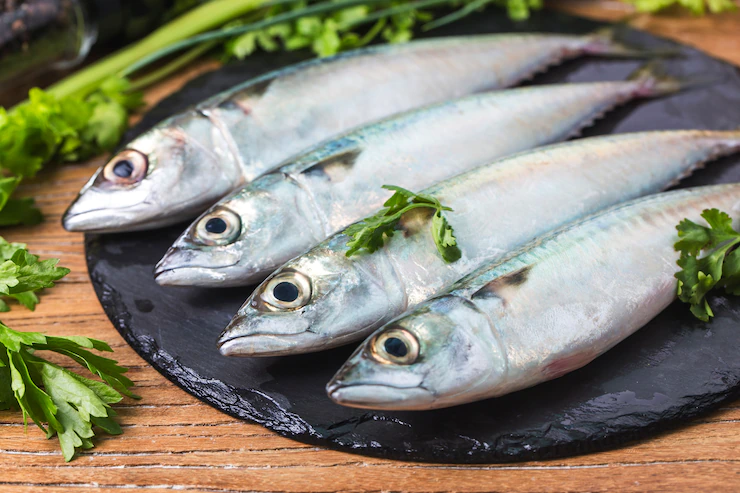Health Benefits of Eating Fish: Eating fish as part of a balanced diet can bring many health advantages. Packed with proteins and essential fatty acids, oily varieties such as salmon, tuna and mackerel provide essential nutrition. Research suggests that regular consumption can lower risks associated with heart disease, stroke and even certain cancers.
Fish is widely thought to increase brain power, improve vision and even help combat depression. Here, we explore 10 incredible health benefits associated with eating fish: its ability to reduce inflammation and heart health improvements as well as vitamin and mineral content will show why so many health experts consider adding it into our diets as one of the easiest ways to boost our wellbeing! So if you want an easy way to improve your wellbeing then adding fish into your daily regimen could be just the solution!
1. Helps Fight Acne

Fish may hold the key to clearer skin. Studies have demonstrated how fish’s high concentration of omega-3 fatty acids can reduce acne and skin inflammation, making it an effective food choice for people suffering from acne-prone skin. Omega-3s are considered essential fatty acids as our bodies cannot produce them on its own – we must get them through food. The best source of omega-3s are fish such as salmon, mackerel and herring; though other sources such as nuts and seeds do not contain as many omega-3s per calorie as fish does.
Fish not only contains omega-3s but also vitamin A – essential to maintaining healthy skin – which is great for quick and easy ways to improve it! Eating two times weekly could even reduce inflammation levels significantly – meaning less acne! So next time you want an easy and quick solution to improve your complexion remember that fish could be just the answer!
2. Helps Improve Vision And Eye Health

Studies have proven that eating fish could help improve your vision. Two servings of oily fish per week was associated with 17% lower risk for macular degeneration compared to eating less than one per week – leading to reduced likelihood of blindness among older adults.
Oily fish is an excellent source of vitamin A, an essential nutrient for eye health. Vitamin A helps protect the retina of the eye and lower macular degeneration risk; additionally it’s essential for eye development in children which could explain why fish is such a great way to improve vision! So if you want an easy way to keep your eyes healthy eating fish could be your solution!
3. Help You Sleep Better

Fish isn’t only good for your physical wellbeing; with its abundance of essential fatty acids and vitamin D, it may also benefit your mental wellbeing. Fish-rich diets may help people sleep more soundly. Vitamin D has long been recommended as part of a healthy sleep regimen – salmon, mackerel, and herring are considered excellent sources of this essential nutrient.
Vitamin B6 can also be found in fish, providing important nutrition for brain and nerve health. Research suggests that eating fish could be especially helpful to those experiencing anxiety or insomnia – providing another easy way to support mental wellbeing! If you want a sure-fire way of improving mental wellbeing, eating more seafood could be the solution!
4. Helps Lower Cholesterol

A high-fat diet can significantly raise cholesterol levels. But eating fish twice weekly could help bring those levels down; fish provides essential omega-3 fatty acids which have been found to have a positive impact on cholesterol. According to estimates, eating twice weekly could reduce your levels by an estimated five percent!
One serving of fish contains approximately 500 mg of omega-3 fatty acids, or approximately 85% of the recommended daily intake. Eating two times weekly has also been found to lower “bad” LDL cholesterol by 10% – something which could prove particularly helpful for people at risk for heart disease. Therefore, eating fish could be an easy and efficient way to lower cholesterol! If you want an easy solution for lowering it quickly and safely.
5. Lowers Risk Of Cancer

Researchers have discovered a relationship between omega-3s and lower risk of certain cancers and regular fish consumption. Studies suggest that people who regularly consume fish, specifically when eaten together with omega-3s, have lower risks of prostate, breast and colorectal cancers – an indicator of anti-cancer properties of omega-3s; eating fish regularly could therefore be one way of decreasing cancer risks in your life. Although studies are ongoing, regular consumption could provide protection.
Fish consumption may help lower cancer risks in various ways; research suggests omega-3s contain anti-inflammatory properties which could aid in cancer prevention. Therefore, eating fish could be one of the easiest and most cost-effective ways of doing just that!
6. Helpful In Alleviating Rheumatoid Arthritis

Study results revealed that eating fish could help relieve symptoms of rheumatoid arthritis. Rheumatoid arthritis is a joint condition which causes pain, swelling and stiffness in joints; omega-3 fatty acids may help ease these symptoms – eating fish high in omega-3s could provide substantial benefit to people suffering from this condition.
Oily fish is a wonderful source of omega-3 fatty acids; one 100 gram serving can contain around 3,000 mg. Sardines and salmon are particularly rich sources. Therefore, eating more oily fish could help ease symptoms associated with rheumatoid arthritis more quickly!
7. Speeds Up Your Metabolism

A diet rich in oily fish could be the key to weight loss. Fish provides essential protein that is vital to metabolic rate; by including this food as part of your daily diet, your metabolic rate should naturally increase over time. Consuming foods high in protein but low in carbohydrates has been found to boost it by up to 30%, providing an advantage to anyone trying to lose or maintain a healthy weight.
Eating fish regularly may also help lower the risk of diabetes. Diabetes occurs when your body cannot utilize the insulin produced by the pancreas, potentially leading to serious health complications and harming itself in other ways. Eating fish could reduce this risk and speed up metabolism – it might just be the answer!
8. Alleviates PMS Symptoms

A diet high in fish could help ease some of the symptoms associated with premenstrual syndrome (PMS). Fish is a rich source of vitamin B6, which has been found beneficial for women suffering from PMS. Vitamin B6 plays an essential role in brain and nerve health and in reducing symptoms related to PMS.
Fish consumption has been estimated to lower PMS risk by 36% and decrease its severity by 25%, making it a simple solution for relieving symptoms of PMS. If this sounds appealing, why not give fish a try!?
9. Lowers Blood Pressure

Studies suggest that diets rich in fish could be one way of helping lower blood pressure. Research has indicated that those who regularly eat fish have a decreased risk of high blood pressure; one third of adults in the UK suffer from high blood pressure.
Lifestyle choices and diet can both contribute to high blood pressure. Fish is packed with magnesium, which may help regulate your blood pressure. Furthermore, vitamin B12 plays an essential role in nerves and blood cells functioning normally – so eating fish could be the answer if you want an easy way to bring down your numbers!
10. Helps Athletes

Fish is an exceptionally nutritious food that can bring athletes numerous advantages. Packed with protein, healthy fats, vitamins, and minerals essential for peak performance, eating fish can aid with muscle repair and recovery, energy levels boosts, cardiovascular endurance improvement and inflammation relief from intense training regimes. Omega-3 fatty acids in fish also can reduce inflammation as well as oxidative stress which is prevalent among athletes due to intense training regimens.
Fatty acids found in fish have also been proven to improve cognitive function and decrease cardiovascular disease risks, while eating fish helps athletes meet daily protein requirements while supporting weight management and meeting daily protein requirements. Overall, eating fish is an ideal food to incorporate into an athlete’s diet in order to reach performance goals more quickly – from improving muscle repair and recovery through to decreasing inflammation and improving cognitive functions
Also Read : The Nutritional Power of Papaya – Uncovering All the Amazing Benefits of This Superfruit






